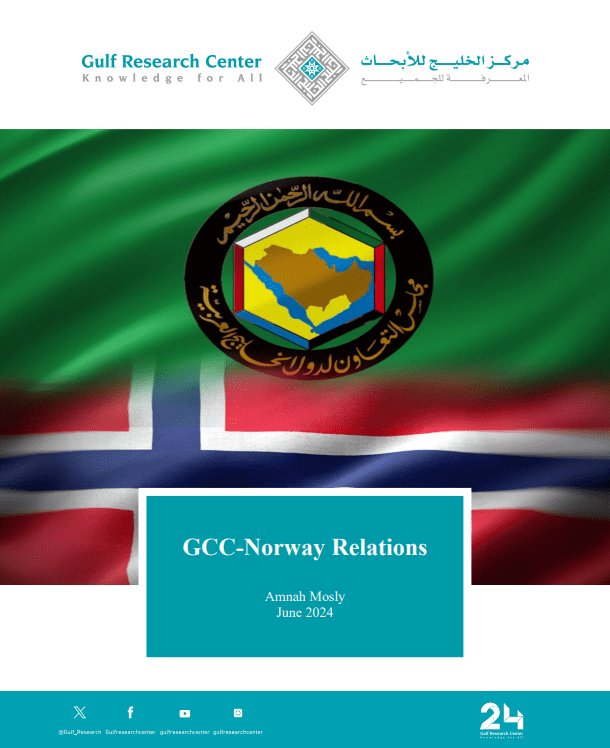
Relations between Norway and the GCC countries are poised for an era of growth and cooperation. In recent years, Norway has demonstrated a rising interest in the Gulf states, recognizing the potential for growing collaboration with the region. This potential was underscored in a statement made in May 2022 by Norway’s then Minister of Foreign Affairs, H.E. Anniken Huitfeldt where she stated that “The Middle East and North Africa region is part of our broader neighborhood. Not just in geographical terms…” and that the region is a crucial component of Norway’s foreign policy, particularly as the Nordic country develops its Middle East policy (Former Minister of Foreign Affairs Anniken Huitfeldt, May 2022).
While bilateral relations have grown in recent years, it is necessary to recognize the need for a more comprehensive understanding of what an enhanced relationship could look like. This understanding should encompass political dialogue, security cooperation, business partnerships, economic ties, energy and environmental cooperation, and cultural collaboration.
Political & Security Cooperation
The political landscape surrounding Norway and the GCC has been significantly influenced by two major crises: The ongoing wars in Palestine and Ukraine. These crises have not only led to increased dialogue and consultation between the two sides but have also brought them closer in terms of political cooperation and engagement, highlighting the high level of convergence of interests and shared concerns.
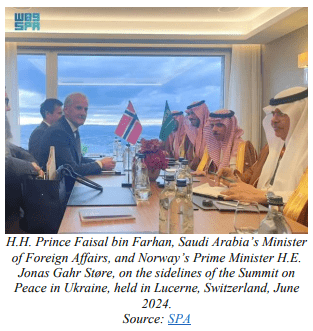
Recent meetings between the two sides include:
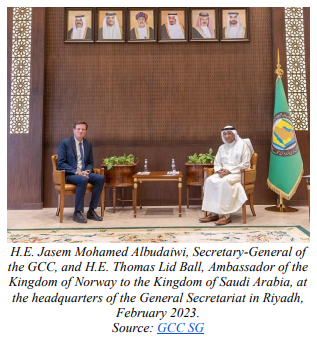
In her speech in May 2022, Norway’s then Minister of Foreign Affairs, H.E. Anniken Huitfeldt emphasized that within the Nordic state’s Middle East policy, Norway can “make a difference in many ways:
As political dialogue between the two sides increases, security and defense cooperation between the GCC and Norway also represent a significant aspect of their evolving relationship, driven by shared concerns about regional stability and global security challenges. H.E. Huitfeldt stated that for Norway, “the focus is therefore on facilitating political dialogue. Between countries. Or between the authorities and non-state armed actors,” with three conflicts as a priority: Yemen, Syria, and the Israeli-Palestinian conflict (Former Minister of Foreign Affairs Anniken Huitfeldt, May 2022).
In Yemen, she highlighted that Norway allocated NOK 225 million (over 21 million USD) in humanitarian aid in 2022, supported the efforts of the UN Special Envoy to encourage talks between the Yemeni government and the Houthis, and coordinated with regional actors, such as Saudi Arabia, to facilitate peace in Yemen. In Syria, the former Foreign Minister stated that “support for the Syria crisis was Norway’s largest single humanitarian effort in 2021” and that the Nordic country continues to work with its regional allies to resolve the issues in Syria. (Former Minister of Foreign Affairs Anniken Huitfeldt, May 2022).
One of the most notable developments in this regard is Norway’s proactive involvement in Palestine. On May 26, 2024, Saudi Arabia and Norway jointly hosted a meeting in Brussels on a coordinated approach to the recognition of Palestine, ending the war in Gaza, and taking the necessary steps to implement a two-state solution (Arab News, May 2024a).
The meeting “stressed the importance of the international community’s recognition of the Palestinian state in order to adopt a comprehensive approach toward a reliable and irreversible path to implementing the two-state solution in accordance with international law and agreed standards, including UN resolutions and the Arab Peace Initiative” (Arab News, May 2024a). This active stance can be seen as an effort by Norway to promote peace and stability in the region.
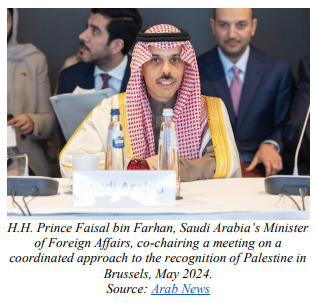
Two days later, Norway, alongside Spain and Ireland, formally recognized a Palestinian state in a coordinated effort by the three Western European nations to add international pressure on Israel to “soften its devastating response to last year’s Hamas-led attack” (AP, May 2024). Norwegian Foreign Minister H.E. Espen Barth Eide said in a statement that “for more than 30 years, Norway has been one of the strongest advocates for a Palestinian state. Today, when Norway officially recognizes Palestine as a state, is a milestone in the relationship between Norway and Palestine” (AP, May 2024).
Additionally, H.E. Jonas Gahr Støre, Norway’s Prime Minister, elaborated, saying: “There cannot be peace in the Middle East if there is no recognition [that] Palestine has a fundamental right to an independent state,” and that Norway will “therefore regard Palestine as an independent state with all the rights and obligations that entails” (Arab News, May 2024b).
The GCC Secretariat, as well as the GCC member states, have all endorsed Norway’s recognition of Palestine as a state. H.E. Jasem Mohamed Albudaiwi, Secretary-General of the GCC, stated that this recognition is “a major turning point” for the two-state solution and “a powerful nudge” for other countries to follow suit (Asharq Al Awsat, May 2024). The Secretary-General also reiterated the “firm stance of the GCC in support of the Palestinian cause and reaching a solution based on ending the Israeli occupation and establishing an independent Palestinian state on the 1967 borders, with East Jerusalem as its capital, in accordance with the relevant UN resolutions and the Arab Peace Initiative” (Asharq Al Awsat, May 2024). The Organisation of Islamic Cooperation, based in Jeddah, Saudi Arabia, similarly welcomed the move as an “important historic step” (Arab News, May 2024b). This unified endorsement underscores the solidarity and support within the GCC for Norway’s recognition of Palestine and overall efforts to promote de-escalation in the Gulf region.
Despite the rise in high-level visits and meetings, there is, however, still a need for increased visibility and engagement in both Norway and the Gulf. The modalities of GCCNorway cooperation on regional security issues should be more closely defined. Areas of better convergence include Norway’s increased role in regional and international de-escalation efforts. As demonstrated above, Norway’s overall diplomatic efforts in conflict resolution suggest an overlap of interests with the GCC states. Therefore, the potential for deeper engagement between the GCC and Norway in the realm of security and defense is a promising avenue for future collaboration.
Energy & Environmental Cooperation
The energy sector has been a cornerstone of GCC-Norway relations, with Norway sharing expertise with Gulf countries, such as Saudi Arabia and Oman, regarding renewable energy and the shift away from a heavy reliance on oil. Norway’s experience and leadership in the field of renewable energy, particularly in the areas of hydropower and wind energy, has presented opportunities for collaboration with the GCC countries as they seek to enhance their own capabilities in the energy industry and reduce their dependence on fossil fuels. Moreover, the launch of the Gulf states’ various national vision programs has provided new growth areas for Norwegian companies in the IT and green technologies sectors. Specifically, under Saudi Vision 2030, these relate to megaprojects such as NEOM, AMAALA, the Red Sea Development Project, Diriyah, Qiddiya, and others.
In July 2023, Norway’s Aker Carbon Capture signed an MoU with Saudi Arabia’s Aramco, to explore partnership opportunities to deploy carbon capture, utilization and storage (CCUS) and industrial modularization in Saudi Arabia and “support Saudi Arabia’s Vision 2030 and the Kingdom’s Net Zero 2060 ambition,” according to Aker Carbon Capture CEO Egil Fagerland (Trade Arabia, July 2023). More recently, the former Minister of State for Foreign Affairs of the Kingdom of Saudi Arabia, H.E. Adel Al-Jubeir, who is now a Member of the Cabinet and Envoy for Climate Affairs, met the Norwegian Minister of International Development, H.E. Anne Beathe Tvinnereim, on the sidelines of the high-level event on Action for the Oceans in June 2024 in Costa Rica where the they discussed areas of joint cooperation regarding the environment and development (SPA, June 2024).
In addition, there are four other areas of potentially more significant joint investments between the GCC and Norway: the oil and gas sector; renewable energy, given the fact that GCC demand in this sector is growing; digital technology, including fintech industries; and agriculture and food industries where GCC countries are increasing their investment. “One key dimension of Norway’s engagement in Saudi Arabia and vice versa is fuel production. What Saudi Arabia and Norway have in common, is that we are producing oil and gas… We also have a common political commitment to cut emissions and to achieve carbon neutrality by making energy production greener, through new technologies… For example, carbon capture and storage by investing in renewables, in hydrogen, and protecting our marine resources, producing sustainable seafood, and breeding maritime industries by aiming for green technologies and carbon neutrality to act in all sectors” stated Amb. Thomas Lid Ball at Norway’s National Day Ceremony in May 2022 in Riyadh (Hassan, Rashid, May 2022). Thus, the two regions should make cooperation for renewable energy and the green transition an essential aspect of their relationship. This includes knowledge transfer to the GCC states.
Economic Cooperation
Economic relations are also an important aspect of the GCC-Norway partnership, with both parties recognizing the mutual benefits of trade and investment. Norway has been a trading partner for the GCC and there has been a steady increase in the trade balance in recent years. Furthermore, Norwegian companies have been involved in various infrastructure and development projects in the GCC region, contributing to the economic growth and diversification of the Gulf economies. Table 1 shows Norway’s trade with the GCC in 2022.
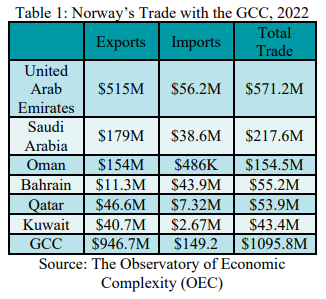
Norway’s two embassies in the Gulf (in Saudi Arabia, which also covers Bahrain, Oman, and Yemen, and in the United Arab Emirates, which also covers Qatar and Kuwait) have heavily supported Norwegian companies in cooperation with Innovation Norway and Norwegian Energy Partners under Team Norway, with their main priorities being “oil and gas, renewables, the maritime and marine sectors, including aquaculture and seafood, as well as digitalization, new technology, and green technology” (The Royal Norwegian Embassy in Riyadh, March 2021).
On the one hand, Innovation Norway (IN) provides experience, networks, and assistance to Norwegian businesses that want to expand internationally and covers the GCC states from its base in Dubai (The Royal Norwegian Embassy in Riyadh, March 2021). On the other hand, Norwegian Energy Partners (NORWEP) is an independent non-profit organization that was founded to improve the long-term basis for value creation and employment in the Norwegian energy sector, with three offices in the Gulf (one in Abu Dhabi, one in Dubai and one in Saudi Arabia) (The Royal Norwegian Embassy in Abu Dhabi, December 2022).
Recommendations for the Way Forward
Moving forward, the most immediate priority should be managing the differences in perceptions by increasing dialogue and communication to improve other aspects of the bilateral relationship. There is a need to enable avenues of cooperation at the mid-level, parallel to the high ministerial level of cooperation. This includes partnerships among think tanks, universities, R&D centers, business-to-business forums, government-togovernment cooperation, research collaboration, and training and exchange programs to address mutual challenges.
Norway and the GCC states should also promote tourism between the two sides and create a civil exchange program to enhance knowledge about the respective regions and improve public perspectives. Lastly, they should develop student exchange programs, vocational training, summer programs, and language programs to provide both GCC and Norwegian students with opportunities and experiences that will benefit them professionally and positively shape their attitudes towards the respective regions.
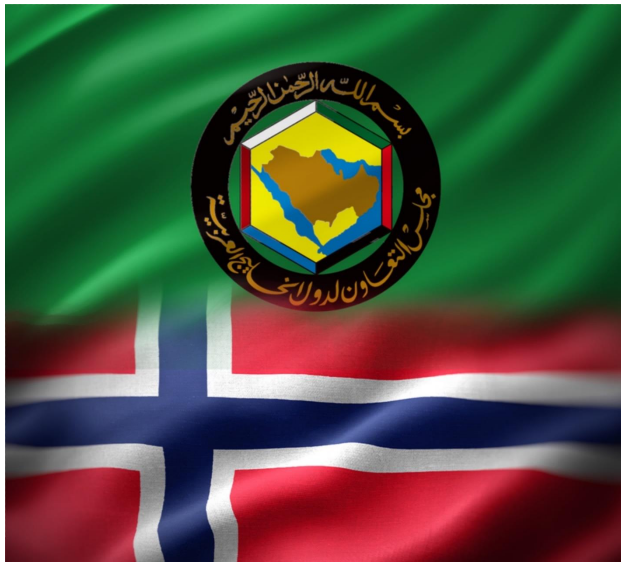
Bibliography
AP, (May 2024). “Spain, Norway and Ireland formally recognize a Palestinian state.” Arab News. https://www.arabnews.com/node/2518391/world
Arab News, (May 2024a). “Saudi Arabia, Norway host meeting on coordinated approach to recognition of Palestine in Brussels.” Arab News. https://www.arabnews.com/node/2517546/saudi-arabia
Arab News, (May 2024b). “Saudi Arabia welcomes move by Norway, Ireland and Spain to formally recognize Palestinian state.” Arab News. https://www.arabnews.com/node/2514691/saudi-arabia
Asharq Al Awsat, (May 2024). “GCC, Arab Parliament Hail Spain, Norway, and Ireland for Recognizing State of Palestine.” Asharq Al Awsat. https://english.aawsat.com/gulf/5023301-gcc-arab-parliament-hail-spain-norway-andireland-recognizing-state-palestine
Former Minister of Foreign Affairs Anniken Huitfeldt, (May 2022). “Norway's engagement in the Middle East.” Govrnerment.no. https://www.regjeringen.no/en/aktuelt/middleeast_engagement2/id2911708/
Hassan, Rashid, (May 2022). “Norway’s relations with Saudi Arabia ‘excellent, growing’: Envoy at national day ceremony.” Arab News. https://www.arabnews.com/node/2084866/saudiarabia
Secretariat General of the Cooperation Council for the Arab States of the Gulf, (February 2023). “GCC Secretary General Discuss the Means to Enhance and Develop Joint GCCNorwegian Relations With the Ambassador of the Kingdom of Norway to the Kingdom of Saudi Arabia.” GCC-SG. https://gcc-sg.org/enus/MediaCenter/NewsCooperation/News/Pages/news2023-2-26-4.aspx
SPA, (June 2024). “Saudi Minister of State for Foreign Affairs Meets with the Norwegian Minister of International Development.” SPA. https://spa.gov.sa/en/N2119645
The Royal Norwegian Embassy in Abu Dhabi, (December 2022). “Business Promotion.” The Royal Norwegian Embassy in Abu Dhabi. https://www.norway.no/en/united-arabemirates/norway-united-arab-emirates/business-promotion/
The Royal Norwegian Embassy in Riyadh, (March 2021). “Business Promotion – Team Norway.” The Royal Norwegian Embassy in Riyadh. https://www.norway.no/en/saudiarabia/norway-sa/promoting-norways-business-interests--team-norway/
The Saudi Press Agency (SPA), (June 2024). “Saudi Foreign Minister, Norway’s Prime Minister Meet in Switzerland. SPA. https://spa.gov.sa/en/N2123763
Trade Arabia, (July 2023). “Norway group Aker seals carbon capture deal with Aramco.” Trade Arabia. https://www.tradearabia.com/news/IND_411371.html
WAM (Emirates News Agency), (June 2024). “Norway Foreign Minister receives Reem Al Hashimy.” ZAWYA. https://www.zawya.com/en/economy/gcc/norway-foreign-ministerreceives-reem-al-hashimy-hf6w4tj7
*Amnah Mosly is a Researcher at the Gulf Research Center